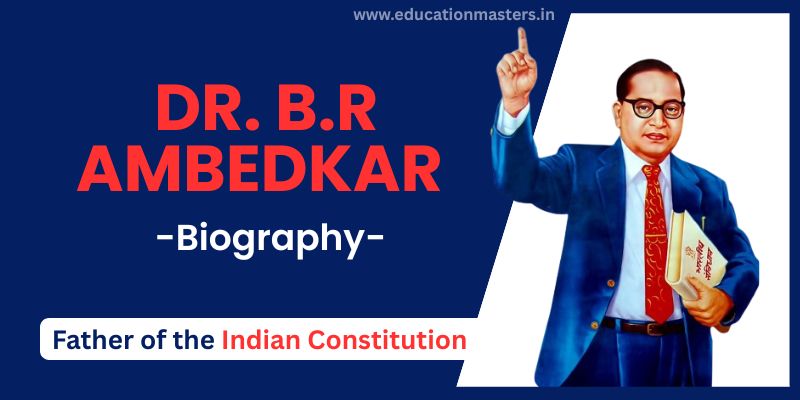KD
I’m Kiran, a content creator at Education Masters. I write and share informative articles on jobs, education updates, and career opportunities to help students and aspirants stay informed and succeed in their goals.

Dr. Bhimrao Ramji Ambedkar, popularly known as Babasaheb Ambedkar, was one of India’s greatest visionaries — a jurist, economist, social reformer, and the chief architect of the Indian Constitution. Born into a marginalized community, he rose through sheer determination and intellect to become the voice of the oppressed.
A tireless fighter against caste discrimination, Ambedkar dedicated his life to promoting education, equality, and justice. His journey — from the dusty lanes of Mhow to the halls of Parliament — symbolizes the triumph of courage over prejudice. Even decades after his death, his message of “Educate, Agitate, Organize” continues to inspire millions across the world.
|
Field |
Details |
|
Name |
Dr. Bhimrao Ramji Ambedkar |
|
Image |
|
|
Birth Name |
Bhimrao Ramji Ambavadekar |
|
Birth Date |
April 14, 1891 |
|
Birth Place |
Mhow (now Dr. Ambedkar Nagar), Madhya Pradesh, India |
|
Nationality |
Indian |
|
Education |
B.A., M.A., Ph.D., D.Sc., LL.D., D.Litt. |
|
Alma Mater |
Columbia University, London School of Economics, Gray’s Inn |
|
Occupation |
Jurist, Economist, Politician, Social Reformer, Writer |
|
Years Active |
1917–1956 |
|
Spouse(s) |
Ramabai Ambedkar (1913–1935), Dr. Savita Ambedkar (1948–1956) |
|
Children |
1 (Yashwant Ambedkar) |
|
Parents |
Ramji Maloji Sakpal and Bhimabai Sakpal |
|
Religion |
Born Hindu (Mahar), converted to Buddhism in 1956 |
|
Death |
December 6, 1956, Delhi, India |
|
Resting Place |
Chaitya Bhoomi, Mumbai |
|
Known For |
Father of the Indian Constitution, Champion of Dalit Rights, Social Reformer |
|
Website |
Dr. Bhimrao Ambedkar was born on April 14, 1891, in Mhow, Central Provinces (now Madhya Pradesh). He was the 14th and youngest child in a poor Dalit (Mahar) family, considered “untouchable” under the rigid caste system.
From a young age, Ambedkar experienced the cruel reality of caste discrimination. He was not allowed to sit with other students in school, drink water from the same pot, or even touch the classroom materials. Teachers avoided interacting with him; he had to sit on a gunny bag apart from others.
Despite these humiliations, Ambedkar’s brilliance shone early. His father, a retired army officer, valued education and encouraged him to study — a rare mindset in a community denied learning for centuries.
Ambedkar’s early struggle against social exclusion, poverty, and prejudice shaped his lifelong mission: to destroy caste oppression and create an India based on equality and human dignity.
Education became Ambedkar’s greatest weapon against oppression. With scholarships and unyielding determination, he achieved what was once thought impossible for someone of his background.
Ambedkar’s academic achievements — five master’s degrees and two doctorates — made him one of the most educated Indians of his time. Yet, even with such brilliance, he faced discrimination upon his return to India.
When Ambedkar returned to India in 1917, he was appointed as a military secretary under the Baroda government. However, his colleagues refused to share office space or water with him because of his caste. Despite his foreign degrees, untouchability followed him everywhere.
Humiliated but not broken, Ambedkar left Baroda and turned toward teaching and public service. He became a professor of economics at the Sydenham College of Commerce and Economics, Bombay, where even students hesitated to accept notes written by him.These painful experiences only deepened his resolve to fight systemic injustice and caste oppression. He believed education, self-respect, and organization were the true means of empowerment.
Dr. B. R. Ambedkar’s life was not just about ideas — it was about action and revolution. He dedicated every moment of his public life to dismantling caste oppression and empowering the marginalized. His movements and reforms reshaped India’s social, economic, and political landscape forever.
Ambedkar founded this organization in Bombay to promote education, health, and socio-economic progress among the “Depressed Classes.” It established schools, hostels, and welfare programs for Dalit children, laying the foundation for organized Dalit activism in India.
One of Ambedkar’s most powerful protests — he led thousands of followers to drink water from the Chavdar Tank in Mahad, asserting their right to access public water. This act of defiance against caste restrictions became a historic symbol of social equality and civil rights in India.
Ambedkar led a massive protest at the Kalaram Temple in Nashik, where Dalits were barred from entering. The movement was not just about temple access but about challenging the spiritual and cultural monopoly of upper castes. It sent a strong message — that every individual deserves dignity before God and society.
Ambedkar represented India’s Depressed Classes at these meetings in London, where he demanded separate electorates and political representation for Dalits. His fearless speeches brought global attention to India’s internal inequalities and the plight of untouchables.
Following Mahatma Gandhi’s fast against separate electorates, Ambedkar agreed to a compromise that reserved seats for Dalits within the general electorate system. Though controversial, it became a turning point in India’s fight for political inclusion and representation.
Ambedkar founded this progressive party to represent the interests of industrial workers, farmers, and marginalized groups. It contested elections and fought for economic justice, fair wages, and labor rights, uniting the working class beyond caste divisions.
He later formed the Scheduled Castes Federation, focusing on political empowerment and legal safeguards for Dalits. It became a platform for Ambedkar to advocate for constitutional equality and oppose caste-based exploitation.
Ambedkar constantly urged Dalits to abandon degrading social customs and claim their right to education, temples, and public spaces. His slogan — “Educate, Agitate, Organize” — became the mantra of a new social revolution in India.
Through these movements, Dr. Ambedkar gave voice to millions who had been silenced for centuries. His efforts not only challenged caste oppression but also redefined India’s democracy — making it more humane, inclusive, and just. He transformed protest into progress, and pain into power.
In 1947, after India’s independence, Ambedkar was appointed as the Chairman of the Drafting Committee of the Indian Constitution.
His vision was to build an India free from inequality, injustice, and oppression. He introduced Fundamental Rights, Directive Principles of State Policy, and provisions for social equality, making India’s Constitution one of the most progressive in the world.
He also fought for women’s rights, labor protections, and religious freedom — ensuring the Constitution was truly inclusive.
On November 26, 1949, the Constitution of India was adopted — a document that reflects Ambedkar’s philosophy:
“Liberty, Equality, and Fraternity are not to be treated as separate items in a trinity. They form a union of trinity in the sense that to divorce one from the other is to defeat the very purpose of democracy.”
Despite his monumental contributions, Ambedkar faced opposition and isolation in politics. Disillusioned with caste discrimination within Hinduism, he studied various religions for years — finally choosing Buddhism as a path of peace and equality.
On October 14, 1956, in Nagpur, Ambedkar and over five lakh followers converted to Buddhism in a massive ceremony, marking the beginning of the Dalit Buddhist Movement.
His final book, “The Buddha and His Dhamma”, expressed his belief that Buddhism’s message of compassion and equality could heal India’s social wounds.
Dr. Bhimrao Ambedkar lived a life marked by discipline, intellect, and humility. Every aspect of his routine reflected his commitment to knowledge, justice, and equality. Despite enduring lifelong discrimination and chronic health issues, he never allowed bitterness to define him — only determination.
Ambedkar’s personality was a blend of scholarship and strength. He was fluent in Marathi, Hindi, Sanskrit, English, Pali, Persian, and French, and had a deep interest in philosophy, law, history, and economics. He was not just a reformer — he was a thinker of global stature, often engaging with the works of Plato, John Dewey, Buddha, and Karl Marx to refine his vision for India.
He owned one of the largest personal libraries in Asia, containing over 50,000 books, which he lovingly called his “greatest treasure.” He read late into the night and wrote extensively — even when struggling with diabetes, weak eyesight, and exhaustion.Ambedkar was also deeply spiritual. While he rejected the caste-based practices of Hinduism, he embraced Buddhism for its rational philosophy, compassion, and moral equality. He found peace in simplicity — living for ideas, not possessions. even in his final years, suffering from poor health, he continued working on books such as “The Buddha and His Dhamma” and “Revolution and Counter-Revolution in Ancient India.” His dedication until his last breath symbolized his lifelong belief
Dr. B. R. Ambedkar’s legacy is monumental — spanning law, politics, education, economics, and social reform. He remains one of the most influential leaders in India’s history and a global symbol of equality and human rights. As the Father of the Indian Constitution, Ambedkar laid the foundation of the world’s largest democracy, ensuring justice, liberty, and fraternity for all citizens. His inclusion of Fundamental Rights, abolition of untouchability, and affirmative action policies continue to protect millions of marginalized people even today.
Dr. B. R. Ambedkar’s legacy transcends politics and time. He is remembered as:
His ideas continue to influence India’s democracy, education, and human rights movements. Statues, universities, and memorials across India honor his name. Ambedkar Jayanti (April 14) is celebrated globally as a day of equality and empowerment.
Dr. B. R. Ambedkar’s life is a story of struggle, knowledge, and transformation — from facing untouchability to shaping the destiny of a nation. His fight for equality remains a guiding light for generations.
“Cultivation of mind should be the ultimate aim of human existence.” — Dr. B. R. Ambedkar
He taught India that education is liberation, equality is strength, and justice is the soul of true democracy.
सरकारी नौकरियों, जीके अपडेट्स और करेंट अफेयर्स की ताज़ा जानकारी सबसे पहले पाने के लिए:
